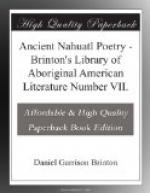A number of these must have come to the knowledge and were probably in the possession of the eminent mathematician and antiquary Don Carlos de Siguenza y Gongora, who lived in the latter half of the same century (died 1700). It was avowedly upon the information which he thought he gleaned from these ancient chants that he constructed his historical theory of the missionary labors of St. Thomas in Mexico in the first century of our era. The title of the work he wrote upon this notion was as follows:—
Fenix del Occidente San Thomas Apostol, hallado con el nombre de Quetzalcoatl entre las cenizas de antiguas tradiciones, conservadas en piedras, en Teoamoxtles Tultecas, y en cantares Teochichimecas y Mexicanos."
For many years this curious work, which was never printed, was supposed to be lost; but the original MS. is extant, in the possession of the distinguished antiquary Don Alfredo Chavero, of the City of Mexico.[45] Unfortunately, however, the author did not insert in his work any song in the native language nor a literal translation of any, as I am informed by Senor Chavero, who has kindly examined the work carefully at my request, with this inquiry in view.
Half a century later, when Boturini was collecting his material, he found but very few of the old poems. In the catalogue of his MSS. he mentions (XIX, 1) some fragments of ancient songs, badly written, on European paper, but he does not say whether in the original or translated. The same doubt might rest on the two songs of Nezahualcoyotl named in his Catalogue (V, 2). He does not specifically state that they are in the original. The song of Moquihuix, King of Tlatilulco, in which he celebrated his victory over the Cuextla, which Boturini states in his text (p. 91) as in his possession, is not mentioned at all in his Catalogue, and it is uncertain whether his copy was in Nahuatl.
His literary friend, however, Don Mariano Echevarria y Veitia, removes the uncertainty about the two songs of Nezahualcoyotl, as he informs us that they were in the original tongue, and adds that he had inserted them in his History without translation.[46] I have examined the manuscript of his work, now in the Lenox Library, New York City, but it does not contain these texts, and evidently the copy used by Bustamente did not.[47]
Boturini included the translations of the two odes of Nezahualcoyotl in a work on the Virgin of Guadelupe, only a fragment of which has been preserved. One of the chapters in this Latin Essay is entitled De Indorum Poetarum Canticis sive Prosodiis, in which he introduces Ixtlilxochitl’s translation and also a song in the original Nahuatl, but the latter is doubtless of late date and unimportant as a really native production.[48]




